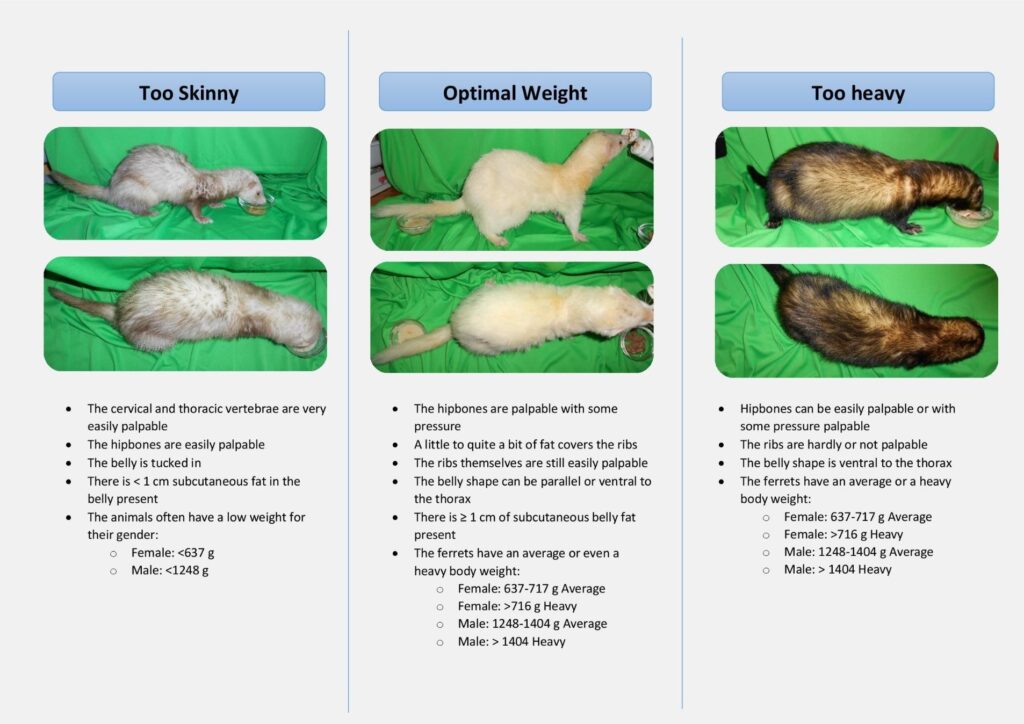
Is my ferret sick?
Ferrets are very particular animals, either in anatomy and behavior. However, when it comes to being sick, we can look for some clues and changes that will help us understand if our pet is sick and we need to see the vet. They do not tend to hide symptoms of disease, like rabbits and birds can do. That makes this job easier, but we still need to know what to look for.
As with other small mammals and birds, checking the weight and body condition will give us general information of the health status of the animal.
Weight:
As with other small mammals and birds, checking the weight and body condition will give us general information of the health status of the animal.
Ferrets can have important weight changes through the year, gaining a few hundred grams in winter and losing them in summer. So far that is physiologic. That makes it quite important to have an average weight for every moment of the year. If they keep gaining weight in winter or lose too much weight in summer, that could be a sign of disease.
You can use a human scale or a smaller scale that would measure grams, depending on the size of your ferret.
I recommend checking the weight every week or every other week, subject to the time of the year, the age and any potential concurrent disease or situation that could affect your ferret’s weight.
Body condition:
Assessing the body condition is always a good idea, especially in combination with weight check. For example, an animal that has lost weight but still remains in good body condition could be just normal seasonal variation, but an animal gaining weight and in normal or even low body condition could be related with a mass growing somewhere inside. To assess the body condition of a ferret, palpate the ribs, spine and abdomen to check for fat deposits and can check the back legs and paraspinal muscles to check the muscle condition. Here is a chart to have an idea.

Other signs:
Other things you can see that can tell you a ferret is not feeling well:
Behaviour changes:
- Less active than normal
- More active than normal
- Aggressive, with other ferrets or in general
- Sleeping more
- Not sleeping well, restless
- Eating less or not interested in certain foods
- Eating much more than normal, sometimes combined with losing weight or not gaining weight.
- Drinking a lot and urinating more, maybe darker urine or lighter urine than normal.
- Pawing the mouth, sometimes together with drooling.
Other signs of disease could be:
- Dragging back legs (usually a sign of weakness, not necessarily related with spine problems). s
- Hair loss, usually on the sides of the body
- Vomits
- Diarrhoea
- Greenish faeces
- Nasal and ocular discharge
- A mass somewhere in the body
- Dark secretion on the ears, scratching ears a lot
- Seizures (common in insulinomas due to hypoglycemia)
Conclusions:
If you see any of these signs or you think your ferret is not well, you should look for veterinary attention as soon as possible as ferrets can deteriorate rapidly.
If you find this post helpful, please share with everyone with a ferret or that could be interested so more people know what to look for if their ferret is sick. Thank you for reading the post, and I hope it was interesting.
References:
- Meredith, A. and Johnson-Delaney, C., 2010. BSAVA manual of exotic pets. 5th ed.
- Bertjin, I., Scoring body condition in the ferret: development of a method based on comparative analysis of condition scoring methods in the cat.
- Quesenberry, K., Orcutt, C., Mans, C. and Carpenter, J., 2021. Ferrets, rabbits, and rodents: clinical medicine and surgery. 4th ed.